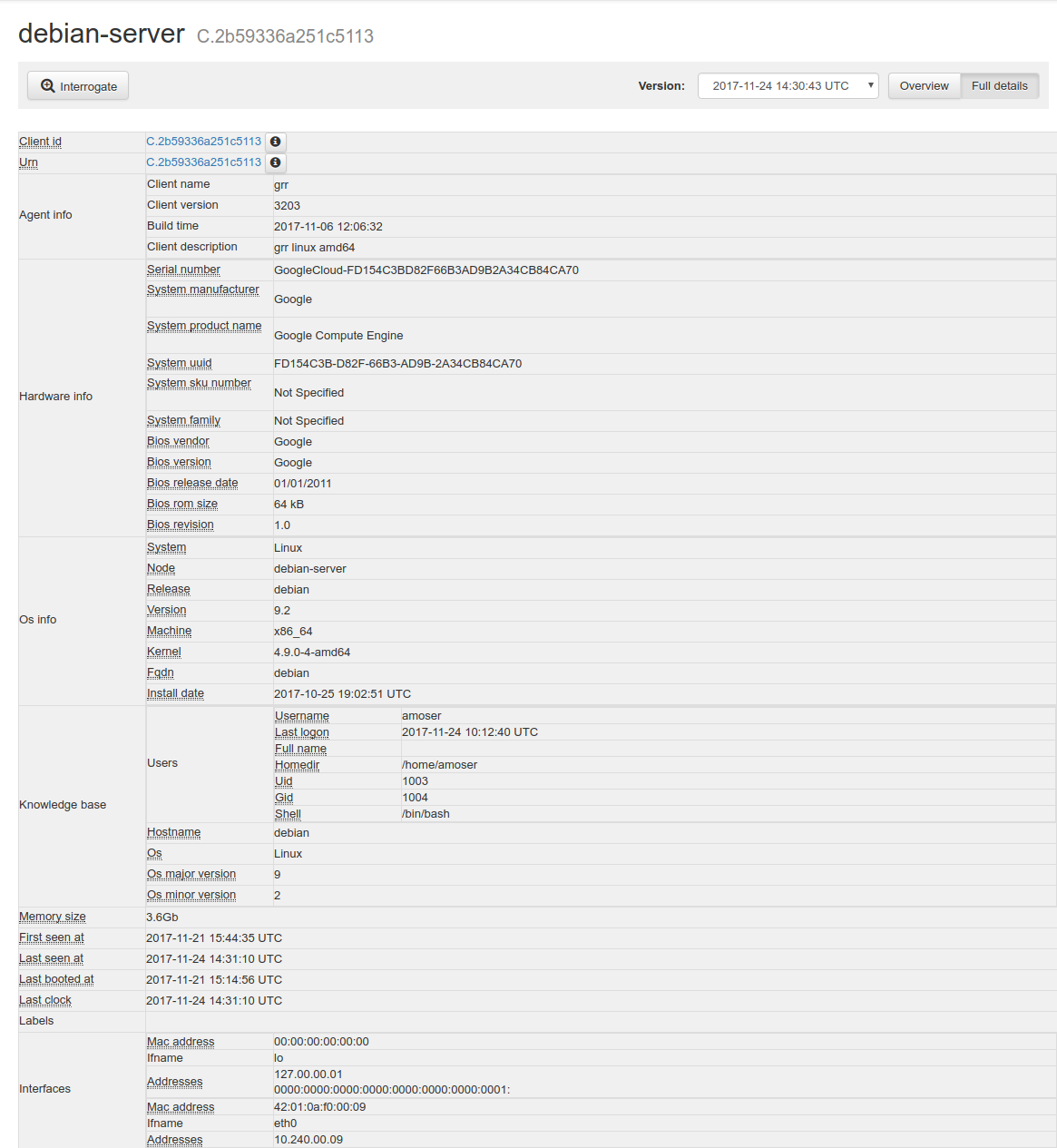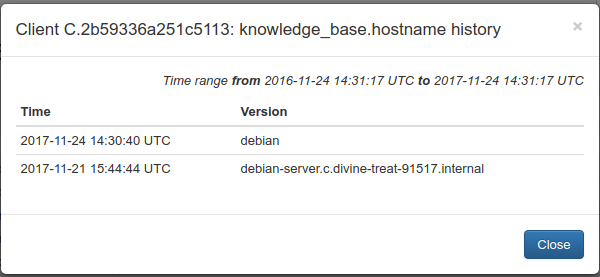AFF4 Data Model¶
AFF4 was first published in 2008 as an extensible, modern forensic storage format. The AFF4 data model allows the representation of arbitrary objects and the association of these with semantic meaning. The AFF4 data model is at the heart of GRR and is essential for understanding how GRR store, analyzes and represents forensic artifacts.
AFF4 is an object oriented model. This means that all entities are just different types of AFF4 objects. An AFF4 object is simply an entity, addressable by a globally unique name, which has attributes attached to it as well as behaviors.
Each AFF4 object has a unique urn by which it can be addressed. AFF4 objects also have optional attributes which are defined in the object’s Schema. For example consider the following definition of an AFF4 object representing a GRR Client:
class VFSGRRClient(aff4.AFF4Object):
"""A Remote client."""
class SchemaCls(aff4.AFF4Object.SchemaCls):
"""The schema for the client."""
CERT = aff4.Attribute("metadata:cert", RDFX509Cert,
"The PEM encoded cert of the client.")
# Information about the host.
HOSTNAME = aff4.Attribute("metadata:hostname", aff4.RDFString,
"Hostname of the host.", "Host",
index=client_index)
- An AFF4 object is simply a class which extends the AFF4Object base class.
- Each AFF4 object contains a Schema - in this case the Schema extends the base AFF4Object schema - this means this object can contains the attributes on the base class in addition to these attributes. Attributes do not need to be set.
- Attributes have both a name ("metadata:cert") as well as a type ("RDFX509Cert"). In this example, the VFSGRRClient object will contain a CERT attribute which will be an instance of the type RDFX509Cert.
- An attribute can also be marked as ready for indexing. This means that whenever this attribute is updated, the corresponding index is also updated.
Client with AFF4 attributes in the UI (larger image):

The figure above illustrates an AFF4 Object of type VFSGRRClient. It has a URN of "aff4:/C.2b59336a251c5113". The figure also lists all the attributes attached to this object.
Every attribute also has an age indicating the time when the attribute was created. Since GRR deals with fluid, constantly changing systems, each fact about the system must be tagged with the point in time where that fact was known. For example, at a future time, the hostname may change. In that case, we will have several versions for the HOSTNAME attribute, each correct for that point in time. We consider the entire object to have a new version when a versioned attribute changes.

AFF4 objects take care of their own serialization and unserialization and the data store technology is abstracted. Usually AFF4 objects are managed using the aff4 FACTORY:
In [8]: pslist = aff4.FACTORY.Open("aff4:/C.d74adcb3bef6a388/devices\
/memory/pslist", mode="r", age=aff4.ALL_TIMES)
In [9]: pslist
Out[9]: <AFF4MemoryStream@7F2664442250 = aff4:/C.d74adcb3bef6a388/devices/memory/pslist>
In [10]: print pslist.read(500)
Offset(V) Offset(P) Name PID PPID Thds Hnds Time
---------- ---------- -------------------- ------ ------ ------ ------ -------------------
0xfffffa8001530b30 0x6f787b30 System 4 0 97 520 2012-05-14 18:21:33
0xfffffa80027119d0 0x6e5119d0 smss.exe 256 4 3 33 2012-05-14 18:21:34
0xfffffa8002ce3060 0x6dee3060 csrss.exe 332 324 9 611 2012-05-14 18:22:25
0xfffffa8002c3
In [11]: s = pslist.Get(pslist.Schema.SIZE)
In [12]: print type(s)
<class 'grr.lib.aff4.RDFInteger'>
In [13]: print s
4938
In [14]: print s.age
2012-05-21 14:48:20
In [15]: for s in pslist.GetValuesForAttribute(pslist.Schema.SIZE):
....: print s, s.age
4938 2012-05-21 14:48:20
4832 2012-05-21 14:20:30
4938 2012-05-21 13:53:05
- We have asked the aff4 factory to open the AFF4 object located at the unique location of aff4:/C.d74adcb3bef6a388/devices/memory/pslist for reading. The factory will now go to the data store, and retrieve all the attributes which comprise this object. We also indicate that we wish to examine all versions of all attributes on this object.
- We receive back an AFF4 object of type AFF4MemoryStream. This is a stream (i.e. it contains data) which stores all its content in memory.
- Since it is a stream, it also implements the stream interface (i.e. supports reading and seeking). Reading this stream gives back the results from running Volatility’s pslist against the memory of the client.
- The SIZE attribute is attached to the stream and indicates how much data is contained in the stream. Using the Get() interface we retrieve the most recent one.
- The attribute is strongly typed, and it is an instance of an RDFInteger.
- The RDFInteger is able to stringify itself sensibly.
- All attributes carry the timestamp when they were created. The last time the SIZE attribute was updated was when the object was written to last.
- We can now retrieve all versions of this attribute - The pslist flow was run on this client 3 times at different dates. Each time the data is different.